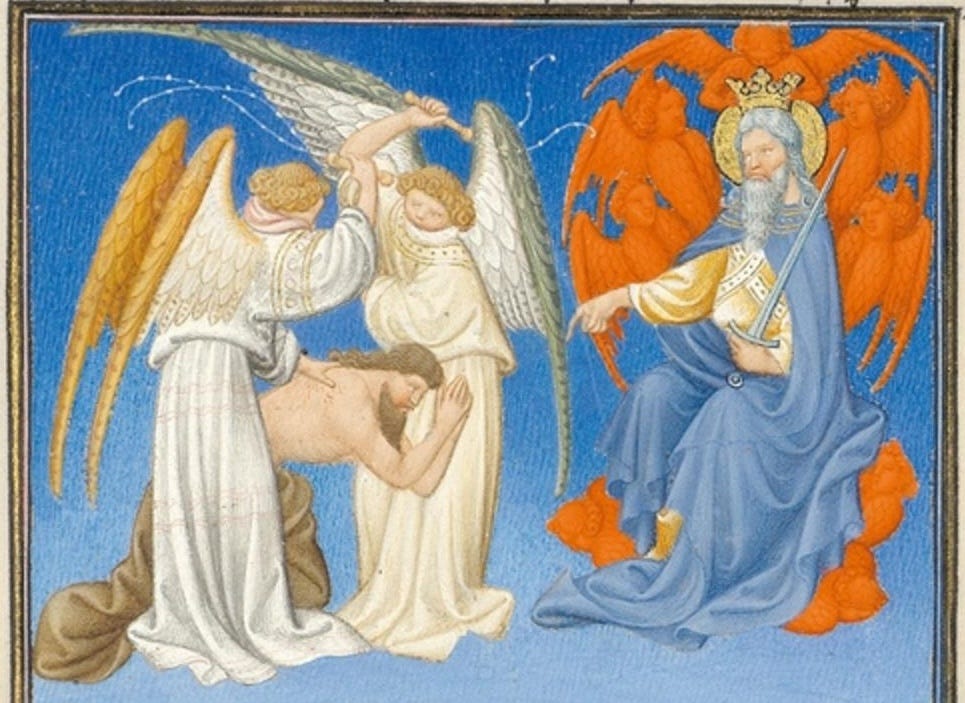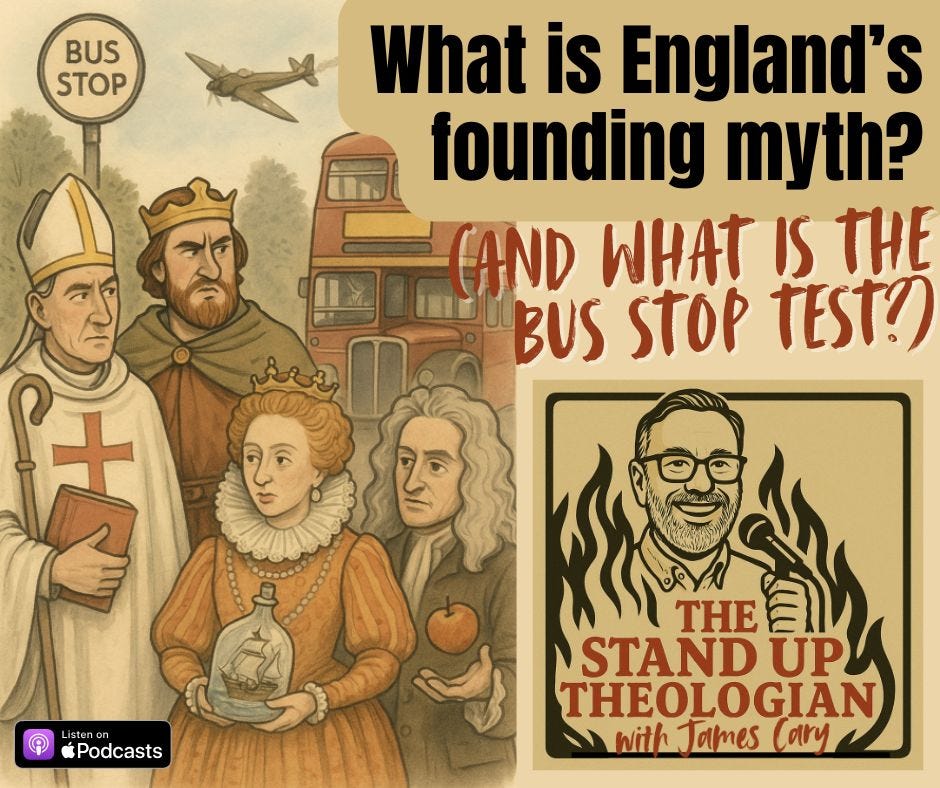Jerome's Nightmare
And the verdict of your reading habits
I have a recurring dream. I’m back at school, perhaps doing A-Levels. I’m halfway through the school term. But I missed the bit where I was given my timetable. Unable to find a noticeboard which gives me this crucial information, I am doomed to wander the school vainly searching for the classrooms where my lessons are being taught. Soon there will be an exam, for which I will be totally unprepared because of this Kafkaesque nightmare.
You probably have your own version of a dream like that. Jerome did too, but his was far more disturbing and productive. Jerome – remembered by the Church of England on 30th September - dreamed that he had been hauled up before a heavenly tribunal. When asked his identity, he replied that he was a Christian. He had every reason to be confident in his answer, having been born into a prosperous Christian family in modern-day Croatia in around 357 before being educated in Rome.
But the judge told Jerome that he was a liar: “You are a Ciceronian, not a Christian.”
Ouch.

This rebuke hit home. Jerome had been devoted to the elegance of Latin literature, especially Cicero. He prized the classics more than the Scriptures. Terrified and chastened, Jerome awoke with a fresh conviction to study scripture rather than being entranced by pagan Roman writers like Cicero.
This was the trigger for Jerome do the thing for which he is most famous: translate the entire Bible into Latin, known as The Vulgate, derived from the Latin for ‘common people’. The language of the Roman empire was Latin. This was a new international version.
It’s All Greek and Hebrew To Me
Jerome began to learn, Syriac, Greek and Hebrew and by the time he was summoned to Rome to serve as the secretary to Pope Damasus I in the 380s, he was already a potent scholar of the Biblical texts. He set about making translations from Greek manuscripts considered more reliable.
Latin versions of Biblical texts had been available in Jerome’s day, but were known to contain errors and mistranslations. Isn’t that astonishing? Scripture had been ignored and neglected by Christians as early as the 4th century AD. It is a blessing that religious controversies came along, since the church was forced back to look at the text of scripture to resolve these disputes.
However, Jerome did not create an authorised Latin version of the Bible which was then ratified and authorised by the Pope or a Church Council. This surprised me when I discovered it. The word ‘Vulgate’ is used in late Medieval English history in a way that implies there was a standard Latin Bible that was used by priests. But there wasn’t.
Jerome’s Latin Vulgate was eventually ratified by the Church of Rome. In 1546. This was at the Council of Trent by time, Jerome’s version was already a thousand years old. And it had already been shown to have serious errors by the great scholar and satirist, Erasmus. He had published more reliable versions of the original Greek New Testament with a fresh Latin translation in 1516. The Latin Vulgate was not corrected until 1592, and even then, it remained mostly Jerome’s work. This was the standard Latin Bible text for the Roman Catholic Church for the next four hundred years, superseded only by the New Vulgate in 1979.
Perhaps this Latin version was a distraction since an English New Testament was approved for usage by English Catholics in 1582. Thirty years passed before an Old Testament was available. But version this was an English translation of Jerome’s Latin version!
Jerome’s translation had clearly taken on a special status that one suspects Jerome himself would have warned against. He would also have been appalled at the syllabus at Oxford or Cambridge in 1500. Students would have heard Jerome’s ossified translations of Psalms in Latin during the Mass, or fragments of the gospels or the Epistles. But in the classroom, they would have spent hours learning the teachings of Aristotle and the rhetoric of Cicero.
Hugh Latimer, who had arrived in Cambridge in that period, was appalled when Erasmus arrived in 1511, teaching Greek, a novelty in England. In time, copies of Erasmus’s New Testament made their way into Cambridge where they would find their way into the hands of men like Thomas Bilney on whom it had a profound effect. In due course, Bilney had a similar effect on Latimer which was to see him preaching to large crowds at St Paul’s Cross, as the voice of the Reformation.
Look in the Mirror
It is easy for us to shake our heads at the hard-heartedness of those who opposed access to the scriptures in the native tongue. Or even an accurate version in Latin. But can we cast the first stone? The Bible contains the very words of life – and we don’t want to read it. We make it a chore or a burden. We don’t read it for pleasure, or joy. We would rather read Cicero. Or popular writers of our own day. Or at least listen to the audio version. Or a podcast summary. Or watch a YouTube video. Or get the gist somehow.
If we were called up before the tribunal of Jerome’s nightmare, what would their verdict be? Would they look at our reading habits and conclude we were Christian? We have been given a great gift: the very word of God. Let us read it.
One way to do that is to use the Church of England’s Daily Prayer app, which is delightfully simple, and bursting with Bible. It is also a podcast. But why not leave a comment below about how you’ve managed to get more Bible into your daily diet? Or reflect on why you find it so hard.
The Story Continues…
Next time, we will continue this theme, celebrating one who was instrumental in getting English Bibles into the churches of England: William Tyndale, remembered on 6th October because, for all his hard work and trouble, he was burned.
Tyndale’s translation shaped the English language and the people themselves. But what is Englishness? What is our founding myth? And we don’t we ever take ourselves seriously? That’s the question I ask Rhys Laverty in the latest episode of The Stand-Up Theologian podcast
I think you’ll really enjoy the episode which I nearly called: 597 and All That.
Here is a longer summary of the episode.
England is a country that once gathered 30 million people round Morecambe and Wise. Now we gather round Netflix, each in our own corner with our own screen. Comedy used to be national glue. Only Fools and Horses was loved by all, and incorporated Thatcherite aspiration. Del Boy was convinced that he would be a millionaire.
But our past and our myths keep changing. In the 1990s, Blackadder Goes Forth told us World War I was pointless muddy slaughter. Today, World War II has recaptured the imagination of many. So is our founding myth Dunkirk? The Battle of Britain?
Politicians now talk up Windrush as a founding myth. A noble story but tiny numbers, though the new arrivals did share our love of cricket. Compare that with today’s unprecedented demographic churn: the biggest since Anglo-Saxon times. Even the Normans managed to blend in, partly because they were Christians.
Is our real founding moment 597, when Augustine of Canterbury baptised Ethelbert of Kent? Out of squabbling fiefdoms came the gens Anglorum—the English people. Christianity gave us law, literacy, kingship, and, erm, humility. Christianity is the software; we are the hardware. Uninstall it, and the system turns into a useless brick.
So why do the English hate earnestness? Rhys Laverty blames the English Civil War when seriousness was lethal. Better to laugh at kings, mock patriotism, and sneer at history than kill each other, right? The trouble is, laugh long enough and nothing is left to love.




Agree that there’s no better way to honor Jerome’s legacy than to read the Bible regularly. For anyone who’d like to see the entire folio where the dream pictured above appears and read its Latin inscription, please note https://blog.metmuseum.org/artofillumination/manuscript-pages/folio-183v.
This week I have been learning how to speak Middle English (ish) so I can read a passage of Tyndale's 1526 NT at church. I've never really looked at Tyndale's work before, and the beauty and time taken to write it so carefully has given me a new appreciation of the words.